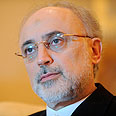
Iran appoints pragmatist Salehi to head nuclear program
Outgoing Foreign Minister Ali Akbar Salehi to head Atomic Energy Organization which is responsible for nuclear facilities
Iranian President Hassan Rohani appointed outgoing Foreign Minister Ali Akbar Salehi to head the Atomic Energy Organization on Friday, state media said, replacing a hardliner with a pragmatist to take charge of Tehran's nuclear program.
Rohani, a relative moderate who took office on Aug. 3, has pledged to improve Iran's ties with the outside world and ease stringent international sanctions on the Islamic Republic over its nuclear program.
Related stories:
- Iran FM condemns chemical weapons use in Syria
- Iran: Rohani forms cabinet, appoints female VP
- Rohani: Iran prepared for negotiations on nuclear issue
Appointing Salehi is a further signal that Rohani intends to pursue a more flexible approach to Iran's nuclear dispute with the West than his predecessor Mahmoud Ahmadinejad.
Western states and Israel say Iran's atomic energy program is in fact an attempt to attain a nuclear weapons capability. Tehran denies the charge and says it only wants the technology to generate electricity and for medical research.
The head of the Atomic Energy Organization of Iran (AEOI) is not directly involved in nuclear negotiations with world powers, but is in charge of operating Iran's nuclear facilities.
He also represents Tehran at the annual member state gatherings of the International Atomic Energy Agency in Vienna each September.
Salehi, Iran's foreign minister under Ahmadinejad from 2011 until Thursday when parliament approved his replacement, returns to his previous job as head of the AEOI.
He takes the place of Fereydoun Abbasi-Davani who survived an assassination attempt in Tehran in 2010.
"It was another wise appointment. Salehi was the best of Ahmadinejad's ministers, a pragmatist who understands how the world works. It made sense to keep him on in some capacity," said Mark Fitzpatrick, director of the non-proliferation and disarmament program of the International Institute for Strategic Studies.
"By returning Salehi to his old position, Rohani sidelines the non-compromising Abbasi-Davani. The outgoing AEOI head, having survived an assassination attempt, seemed unable to overcome bitterness toward the West."
A new head of the Supreme National Security Council, who has traditionally acted as Iran's chief nuclear negotiator, has yet to be appointed.
The delay has led some Iran-watchers to speculate Rohani may want to the bring the job of nuclear negotiator under the foreign ministry, giving an even stronger signal that he wants to streamline the talks process.
- Receive Ynetnews updates directly to your desktop










